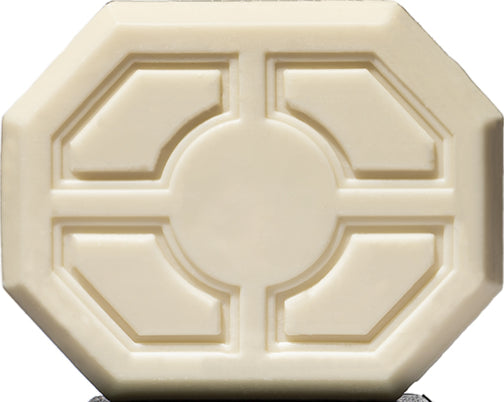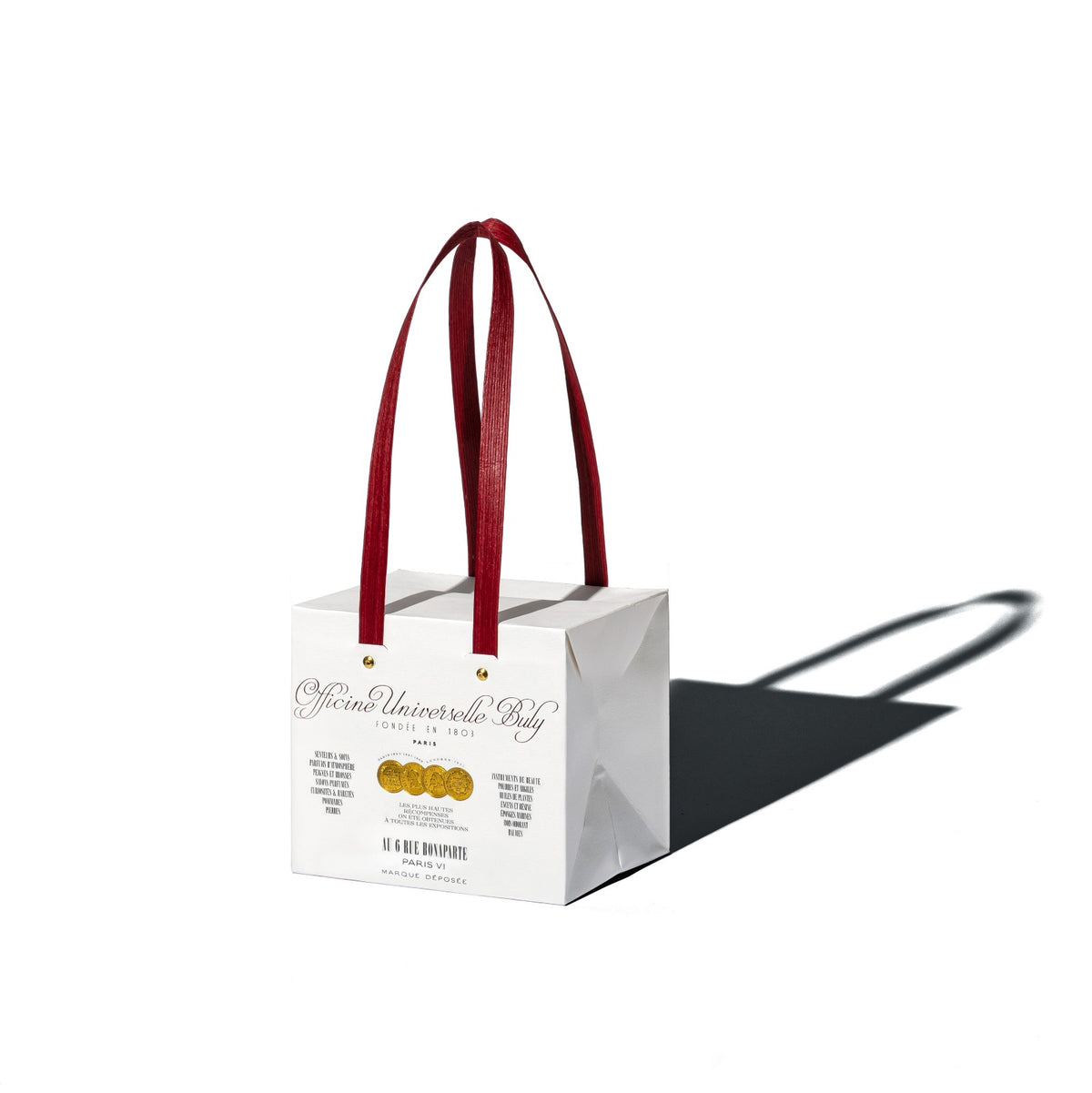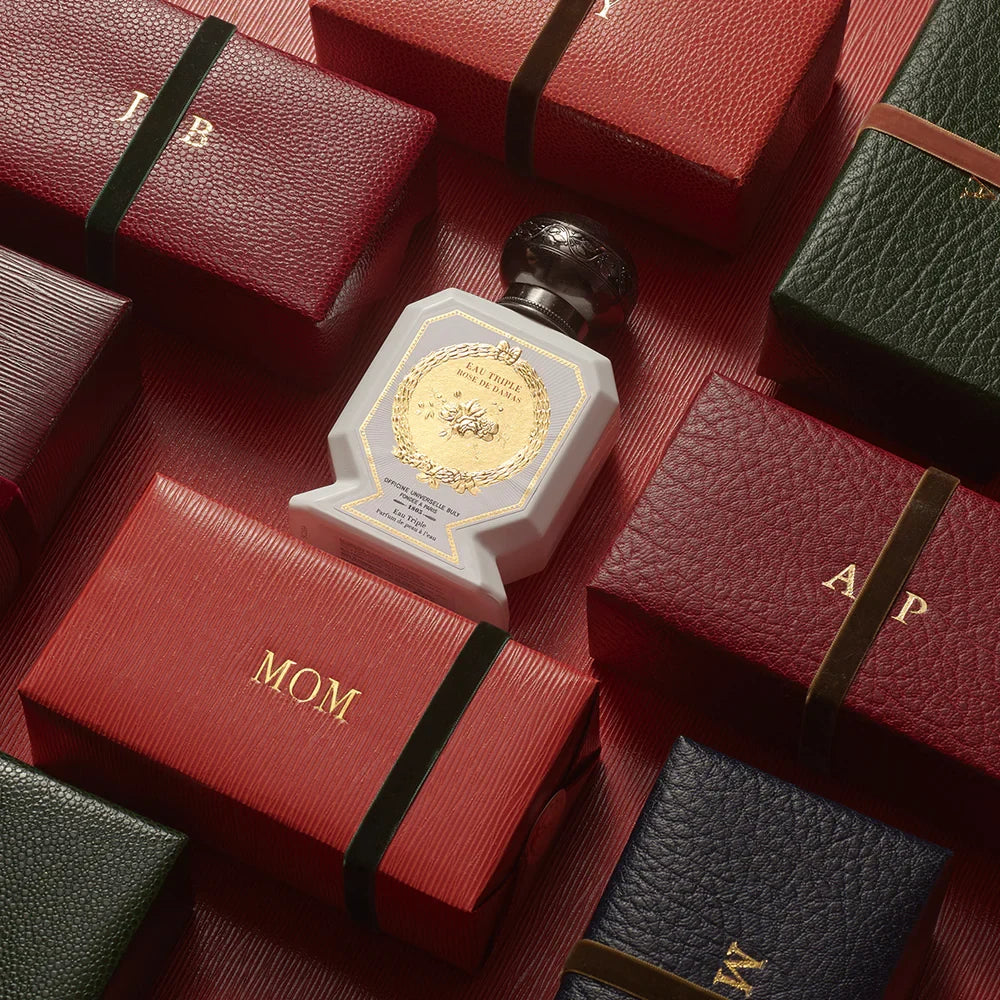The Venus de Milo, an Eau Triple by Officine Universelle Buly was inspired by one of the Louvre’s most famous pieces. She came to be as the result of an extraordinary challenge. For the first time in the history of the world’s largest museum and that of perfume, Buly invited eight illustrious “noses” to design an exceptional collection. Everyone was given the same, thrilling challenge: to envision and create the scent of a universal masterpiece of painting or sculpture, and to bring that alive in a perfume.

“La Vénus de Milo” was imagined by a master perfumer, Jean-Christophe Hérault, who scented this sculpture in an ardent olfactory triptych where mandarin, jasmine and amber combine. Seduction in its purest form.
This perfumery challenge echoes the exceptional destiny of this statue discovered by chance, two centuries ago, in ancient ruins on the island of Milo and which, since then, has experienced a thousand adventures.
Finally, beyond these adventures, the most extraordinary remains the infinite power of fascination of this statue, with which all the greatest artists from Rodin, to Miles Davis, to David Lynch have fallen madly in love...
What would the Venus de Milo smell like if we met her in the street? This was the challenge taken up by Jean-Christophe Hérault, the nose who designed this Eau Triple for Officine Universelle Buly: “I imagined Venus as a floral perfume. It is a praise of femininity. She represents the goddess of love. Her female body is deliberately highlighted. On one side a bouquet of floral notes, and at the same time, it is marble: cold matter, hieratic pause, no facial expression. So I tried to transcribe this feeling into a perfume with an amber, woody, modern structure. »
Venus de Milo expresses a profusion of flowers magnified by jasmine with an almost carnal olfaction. The majestic flower is harvested at dawn so that it is at the peak of its fragrance and then happily surrounded by spices and musky accords. To give substance to the superb nature of this sculpture, the perfumer summons intense citrus notes such as mandarin, the fruit of an elegant shrub whose importation into Europe in the 19th century captivated France, Italy and Spain. and in particular… Greece which dedicated its cultivation to it in the lush orchards of Chios. Synonymous with abundance, its slightly acidic-sweet temperance seems to move the marble and inspire movement.
Finally, the amber resin gives the masterpiece a delicately dark, almost wild tone. Bordering on woody and tobacco scents, amber gives Venus a golden, shimmering shine, as disturbing as it is sensual.
In a few weeks, at the end of August, this unique perfume will finally be available in two body treatments: an Antique Oil, a fragrant dry oil with a regenerating and restructuring complex, based on sesame and apricot oil. and coconut and Virginal Milk, a moisturizing milk scented with perfect softness and creaminess.


At the beginning of April in 1820, a young French sailor keen on archeology, Olivier Voutier, idle during a stopover on the island of Milo in the Cyclades, visits an ancient site when he comes across a Greek peasant, Yorgos Kendrôtas, who, in search of construction equipment, has just made an incredible find. Two immense pieces, a bust and a magnificent drapery, are freed from the ground. He made a sketch and immediately notified the consular authorities to acquire this treasure, a goddess whose features reminded him of the woman he dreamed of, Catherine Brest, the wife of the local Consul. The French Ambassador in Constantinople decided to buy it from the Greek authorities to offer it to Louis XVIII and at the end of diplomatic games as tense as they were incredible between the Ottomans and the French, she finally embarked for France and arrived a year later in Louvre Museum.
A monumental statue – it measures more than two meters – the Venus de Milo, is sculpted in Parian marble, a white marble with a particularly fine grain, almost translucent. Its exceptional drape and its helical position prove the excellence and even the genius of a sculptor whose name we will never know, who probably created it in the 2nd century BC.
the island of Milo

This work is unique because it is incomplete.
Who is she ? Although an arm was found on the site in Milo, restoration attempts were never successful. Was she a Danaide carrying an amphora, Artemis the goddess of Nature brandishing a bow or a muse with her lyre?
Even if the left hand traditionally carrying the apple of discord has never been found, its identity has been decided: it will be Venus, goddess of love, one of the rare representations of a woman with a bare breast in ancient Greece.
In two centuries at the Louvre Museum, the Venus de Milo has escaped several wars.
During the Franco-Prussian War in 1870, she spent months in the greatest secrecy in the basement of the Paris police headquarters then, during the Commune, narrowly escaped a fire before returning to the Louvre where she was rise into a more upright posture.
The day the Second World War was declared, September 3, 1939, the Venus de Milo was evacuated in one day according to a plan designed in 1938 by the director of the Louvre, Jacques Jaujard, with 4,000 other extraordinary works, hidden in castles in the countryside away from bombs and strategic targets. Prepared with ropes to hold the two pieces together (see the photograph below) and a reinforced crate, the statue leaves secretly by truck with the Victory of Samothrace to the Château de Valençay, property of the Duke of Talleyrand protected by its German title by Duke of Sagan. In June 1940, when German troops arrived in Paris, the museum appeared completely abandoned, decorated with thousands of empty frames. The Louvre will reopen in August 1945 after the victory and the return of all its works.
The last – epic – journey of the Venus took place in April 1964: she then traveled with great fanfare with Georges Pompidou on the advice of her Minister of Culture André Malraux for an official visit to Japan. The statue will suffer from this journey – it was decided that it would travel in one block instead of two – and suffered damage that was urgently repaired by the Louvre restorers.
The reception of the most famous statue in the world in Tokyo is triumphant. Once again, the whole world pays tribute to its exceptional beauty.
Since its arrival at the Louvre in 1821, the Venus de Milo has sparked the greatest passions. It fascinates artists, writers, sculptors, and others: all in love with its eternal beauty.
She undoubtedly inspired Delacroix in 1830 for his incredible “Liberty Leading the People”, half naked, draped in a skirted fabric and half turned towards the crowd. We also find it in this verse by Charles Baudelaire “I am beautiful, oh mortals, like a dream of stone…”, in studies by Paul Cézanne or in a poem by Rainer Maria Rilke…
But the most in love of all was undoubtedly Auguste Rodin who, throughout his life, never stopped admiring her at the Louvre and wrote a large essay full of passion about her in 1914: “To the poets , to researchers, to modest artists, in the midst of the tumult of the city, you give long moments of refuge. Mutilated, you remain whole in their eyes. If the outrage of time was permitted, it was so that a trace of his impious effort and his impotence would persist. You are not a vain and sterile statue, the image of some unreal goddess of the Empyrean. Ready for action, you breathe, you are Woman, and that is your glory. »
Venus, always a muse, was a little mistreated in the 20th century by certain artists: Niki de Saint Phalle sprayed her with bright paints, Magritte put handcuffs on her, Dali transformed her into a cabinet of drawers, and Arman frantically sliced her in the direction of the length.

More lyrically, the jazzman Miles Davis made it a captivating piece of bebop on his album “Birth of Cool” recorded in 1949 and Boris Vian sang it like a surreal 'Venus de Milo'
Finally, the most esoteric of filmmakers, David Lynch, gave it a special place in his filmography: in the astonishing third season of Twin Peaks in 2017, the statue inhabits the Black Lodge, a supreme enigma, and transforms from time to time into another Venus, Lynch alternating depending on the scene with the Venus of Arles sporting only a left arm and the Venus de Medici, intact. Quite a symbol for this stone idol, bearer of an eternal mystery.
VENUS OF MILO, MILES DAVIS

Sign up to receive the future dispatch from the Officine.

We will send you an email to reset your password
An error occured adding item to your bag.
Your cart is currently empty
Upon request, your purchases are wrapped in a printed paper reproducing an old newspaper or slipped into an elegant, green-marbled gift pochette, as an homage to the creation and history of the Officine Universelle Buly.
The Exceptional origata gift wrapWHETHER FLORAL, STRIPED OR CHECKERED, AND ALWAYS HIGHLY CHROMATIC, THESE JAPANESE PAPERS ARE INSPIRED BY THE MOTIFS RESERVED FOR KIMONOS AND ARE FOLDED ACCORDING TO THE HIGHLY CODIFIED ART OF ORIGATA.
Monogram gift wrap

Choose the size of your bag
DEPENDING ON MY ORDER ∙ 2,00 €
XS 10X10CM ∙ 2,00 €
S 20X20CM ∙ 2,00 €

Select the products to be gift wrapped
These products are already gift-wrapped
None of the product in the cart are compatible with this service

Select the products to be gift wrapped
These products are already gift-wrapped
None of the product in the cart are compatible with this service

Select the products to be gift wrapped
These products are already gift-wrapped
None of the product in the cart are compatible with this service
Every request will be respected as far as possible and the possibilities are great at Officine Universelle Buly.
Quantity :

Have your initials or those of the lucky recipient engraved in the heart of your Savon Superfin.
Have your initials or those of the lucky recipient of your gift engraved on the accessory
Have your initials or those of the lucky recipient of this gift engraved on the kit, the balm, the comb and on the toothbrush
Our bottles, candles and incenses are carefully packaged with handwritten calligraphy labels.
Our master calligrapher, armed with a quill and ancient ink pads, will create a wonderful bookplate on the title page.
We mail your calligraphic message directly to your recipient.
However, it seems that you are in Japan, would you like to switch to our Japanese website based in Tokyo?
Visit our Store